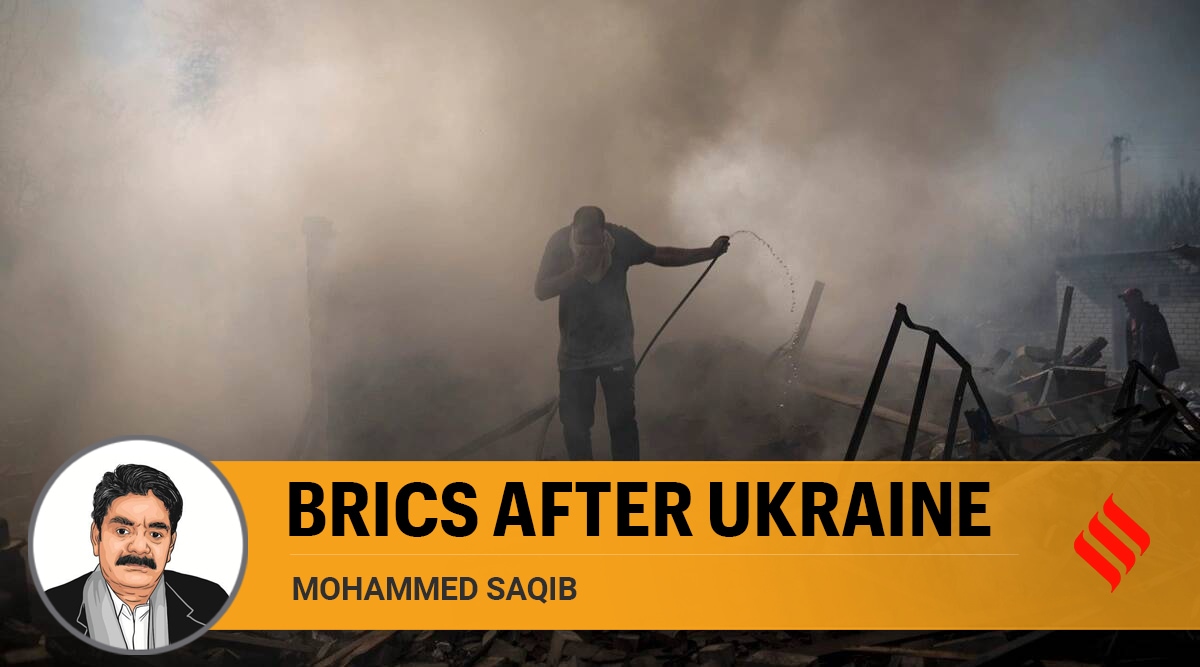 The Ukraine crisis could be an occasion for the leaders of BRICS nations to commit themselves to the original goal of the bloc. It's an opportunity they shouldn't let go of. (AP Photo/File)
The Ukraine crisis could be an occasion for the leaders of BRICS nations to commit themselves to the original goal of the bloc. It's an opportunity they shouldn't let go of. (AP Photo/File) Russia’s conflict with Ukraine has complicated the agenda of the two-day BRICS summit that begins on Thursday. The focus of the Beijing-hosted virtual summit will be centred on the conflict and the association’s future. The leaders of BRICS countries — Brazil, Russia, India, China and South Africa — will navigate the crucial dilemma of evolving a common stance on the Russian-Ukraine conflict.
How should the BRICS find a way out of its current dilemmas? Will they become a major distraction from its primary agenda of rebalancing an international system dominated by the West? Will it advance the role of BRICS as a leading force for global economic governance reform? Or will the geopolitical considerations of its members come in the way of attaining the grouping’s original goal? The answer to these questions lies in the way BRICS adapts to the new realities. The current predicament could be an opportunity to challenge the existing system dominated by unilateralism and exclusion.
Economically, militarily, technologically, socially and culturally, BRICS nations represent a powerful bloc. They have an estimated combined population of 3.23 billion people, which is over 40 per cent of the world’s population. They account for over more than a quarter of the world’s land area over three continents, and for more than 25 per cent of the global GDP. The grouping comprises two of the fastest-growing nations, India and China.
The new geopolitical reality, where so much is in flux and unclear, creates a space for powerful new narratives. Some of the BRICS members could be potential targets of the kind of economic warfare deployed by the West against Russia. It is time that BRICS and other like-minded countries seriously work toward the creation of a parallel economic bloc that doesn’t rely on US-led institutions. The West has so far not expected the BRICS countries to stringently adhere to its sanctions against Russia. But it will be naïve to expect that they will persist with this attitude.
Best of Express Premium
Can BRICS withstand the economic and institutional might of the West? It has proved its mettle to an extent by establishing the BRICS New Development Bank (NDB) and the Contingency Reserve Arrangement (CRA). However, despite the group comprising China, India and Russia, intra-BRICS trade accounts for less than 20 per cent of global trade and BRICS is far from having its own payment mechanisms, international messaging systems or cards. Initiatives such as the NDB should have, by now, given some competition to the Western lenders. Challenging the economic might of the West in the near future might be close to impossible. However, the Ukraine crisis should drive home the need to create institutional arrangements that can cushion against similar financial turbulence in the future.
BRICS requires a recalibration of its structure and agenda. Creating financial mechanisms and technological institutions could turn BRICS into a G20 for developing nations. It’s time to revisit the idea of expanding the grouping by inviting new members. This could also impart new vigour to the BRICS’s developmental goals.
Economic cooperation between India and China is vital for the success of any future BRICS endeavour. The border conflict has created a mistrust of China in India. In the current situation, New Delhi is unlikely to take an anti-West stance. India, unlike China, is neither a UN Security Council member nor does it have major sticking points with the West. At the same time, India is not a part of the Western camp. That does open up the possibility of New Delhi taking a more proactive position in BRICS. So far, it has taken a subdued position on several matters in the grouping. The two powers need to come together for the sake of global governance reform.
The emergence of an alliance of nations in the global south, that breaks the West’s hegemony, could be a game-changer in geopolitics. The Ukraine crisis could be an occasion for the leaders of BRICS nations to commit themselves to the original goal of the bloc. It’s an opportunity they shouldn’t let go of.
This column first appeared in the print edition on June 23, 2022 under the title ‘BRICS after Ukraine’. The writer is Secretary General, India China Economic and Cultural Council
- The Indian Express website has been rated GREEN for its credibility and trustworthiness by Newsguard, a global service that rates news sources for their journalistic standards.

